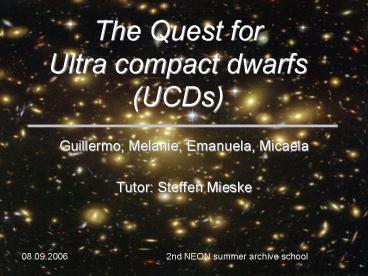The Quest for Ultra compact dwarfs (UCDs) - PowerPoint PPT Presentation
Title:
The Quest for Ultra compact dwarfs (UCDs)
Description:
The Quest for Ultra compact dwarfs (UCDs) Guillermo, Melanie, Emanuela, Micaela Tutor: Steffen Mieske 2nd NEON summer archive school 08.09.2006 – PowerPoint PPT presentation
Number of Views:73
Avg rating:3.0/5.0
Title: The Quest for Ultra compact dwarfs (UCDs)
1
The Quest for Ultra compact dwarfs (UCDs)
- Guillermo, Melanie, Emanuela, Micaela
- Tutor Steffen Mieske
2nd NEON summer archive school
08.09.2006
2
Outline
- Introduction
- Photometric search for UCD candidates
- UCD candidates in Abell 1689 spectroscopic
follow-up - Redshift determination and results
3
Introduction
4
The search for the smallest galaxies starts
Where do we start looking for them?
We have a clue Ultra compact dwarfs in galaxy
clusters
5
Early types family album
dE 700pc
M87 7kpc
Globular cluster 3pc
6
Brightness/size distribution
7
How are UCDs created?
8
How are UCDs created?
- Two formations scenarios
- Compact remnants of tidally stripped galaxies
(Bekki et al. 2003) - Merged stellar super clusters (Fellhauer Kroupa
2002) - Observations simulations stellar super
clusters have masses lt108 Msun - Idea Search for very luminous UCDs that are too
massive to be explained by merged star clusters.
If found, support for galaxian origin of at
least some UCDs. - Where? Search in very massive galaxy clusters!
9
Photometric search for UCD candidates
10
Abell 1689 A massive Galaxy Cluster
- RA 131134.2
- Dec -012156
- z 0.183
- (m-M) 39.7
- Distance 700Mpc
- Diameter 6.5Mpc
- Mass 2(1015) M?
(NED Broadhurst et al. 2005)
11
Photometric Search for UCD candidates in Abell
1689
- HST/ACS drizzled griz images from June 2002
- PSF FWHM 0.1'' (2 pixels) --gt 300pc. UCDs are
unresolved! - Source detection and extraction with SExtractor
12
Candidate Selection
- Detected on all bands group A SExtractor
independently on all 4 bands, 5 ?group B
SExtractor in dual detection, 10 ? - class_stargroup A class_star gt 0.1 in all 4
bandsgroup B class_star gt 0.5 in at least 1
band - FWHMgroup A FWHM lt 2PSF in all bandsgroup B
FWHM lt 2PSF in i band - i lt 26.5
- Colour cuts photo-z (next slide)
13
Dots resolved sources
14
Group A Group B
15
2 UCD candidates marginally resolved! Reff few
100 pc, Mz-17 mag if at cluster distance
16
Spectroscopicfollow-up
17
UCD candidates in Abell 1689spectroscopic
follow-up
- redshift
- ESO ARCHIVEsearch for spectroscopic data
- VLT telescope spectrograph all available data
were taken with the FORS2 spectrograph (MXU) - Type of files you get
- - acquisition
- - flat field
- - bias
- - science
18
THE INSTRUMENT FORS2
- field of view 7'x7' (2048x2048 pix)
- GRISM GRIS_150I
- MOS MODE (MXU)
19
DATA REDUCTION
- bias subtraction
- image combination
- candidates search
- list a) 12 photometric candidates gt 4 have
spectra - list b) 20 photometric candidates gt 3 have
spectra - spectrum of brightest candidate (z 21.95 Mz
-17.8 mag)
20
SPECTRA EXTRACTION
- spatial cut (y direction)
1D spectra
21
WAVELENGTH CALIBRATION
- extract the 1D spectra from the wavelength
calibration lampspectra using the same trace
from the candidate spectra
22
(No Transcript)
23
Redshift determination and Results
24
Spectroscopic Redshift determination
- locate the prominent HK break ?0 for CaK
3933.663 A ?0 for CaH 3968.468 A
25
Redshift determination cont.
- measure the center of each of the 2 absorption
lines in our calibrated spectra - calculate the redshift
26
Final results
- candidate 131132.56 - 011950.61
131132.91 - 011924.22 - __________________________________________________
______ - redshift 0.18781 0.0003
0.20640 0.0005 - Mz -17.75 -17.25
- Lsun 5.0108
3.2108 - Msun 1.5109
9.5108
27
Luminosity lt-gt size
UCDs in Fornax
28
Luminosity lt-gt size
UCDs in Fornax
29
Summary
- We discovered two UCDs with masses 10 times
higher than merged star cluster limit in Abell
1689. - Support for galaxian origin of (some) UCDs.
30
Outlook
- Spectroscopic follow up of fainter UCD candidates.

